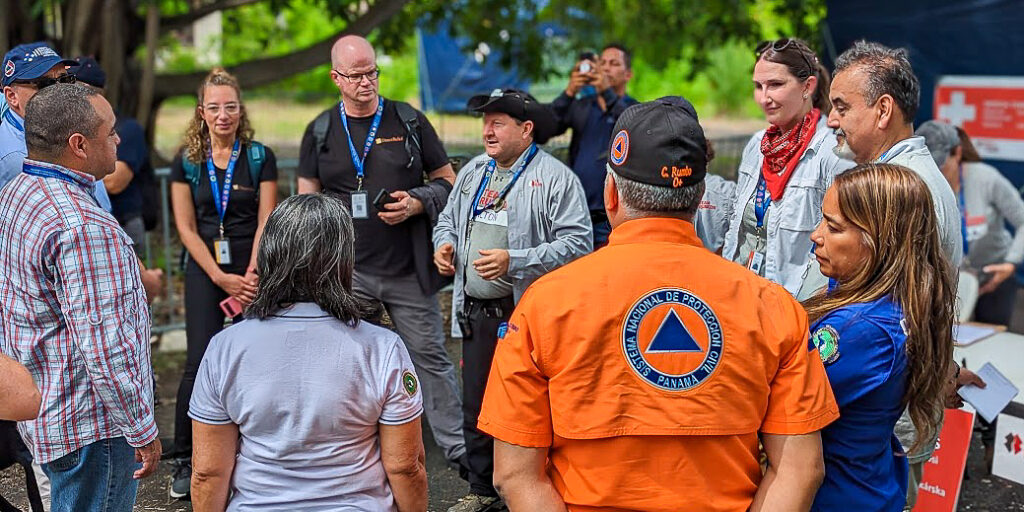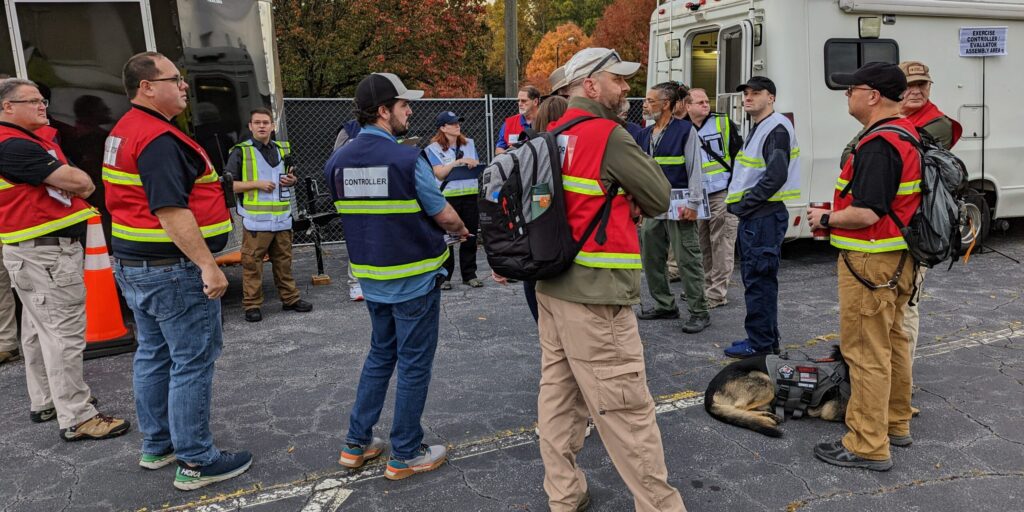For a community to effectively respond to and recover from disaster, that community must first understand its capabilities before the disaster happens. Decades of research demonstrate that every dollar a community spends on disaster preparedness can save anywhere from $4 to $11 in response or recovery costs. One of just a handful of nongovernmental organizations to have a seat within FEMA’s National Response Coordination Center Team Rubicon has extensive experience and recognized expertise in disaster management and preparedness. Sharing that expertise in a professional setting is one of the most valuable services Team Rubicon offers vulnerable communities.
As a longtime sponsor of Team Rubicon, FedEx has helped countless communities after disasters across America. Team Rubicon’s mission, however, is to serve global communities before, during, and after disasters and crises, and FedEx’s partnership extends into supporting the before phase as well. Disaster preparedness exercises are one of the most effective ways that Team Rubicon reduces the impact of disasters on vulnerable communities: by bolstering the disaster management capacity in those communities. FedEx is a crucial ally in providing communities at risk with the knowledge and training to successfully plan for future crises.
How Communities Benefit from Disaster Preparedness Exercises
Many communities lack the resources to conduct disaster exercises effectively; community leaders need significant time, money, and trained personnel in order to practice their disaster-management strategies. Team Rubicon Greyshirts regularly conduct disaster preparedness exercises across the country for a wide variety of threats, from wildfires to floods—whatever hazard a community could face—all of which are run by Master Exercise Practitioners. Master Exercise Practitioners are FEMA-trained and -certified exercise managers. They are professionals with advanced knowledge and skills in emergency management exercise design, conduct, and evaluation. The professional structure of an experienced team can lead to great potential savings for communities that lack the resources to perform their own exercises.

“Most of the areas that we go to don’t have adequate funding or staff,” said Michael Brady, one of Team Rubicon’s Master Exercise Practitioners, “and our ability to bring these simulations at no cost to the community, along with our experience and certification, helps them build their capabilities.”
Building capacity begins with identifying disaster preparedness deficiencies, such as a lack of appropriate response equipment, an inadequate communications system, or staff without the necessary training to respond to a disaster. One of the primary advantages of these simulations is that they offer a no-fault, low-cost environment in which to stress-test a community’s disaster plans. Another advantage of these exercises is that the benefits scale up for tinier communities, says Team Rubicon’s Exercise & Field Leadership Manager, Greg Ramoni. “The smaller the community, the more time- and cost-prohibitive such an exercise is and so the greater the benefits to the community become.”
Most recently, this was the case for a small college in Wisconsin. In October of 2023, Team Rubicon helped the college conduct a tabletop exercise—a classroom-style simulation in which participants discuss their roles during a specific potential emergency and their responses to that particular scenario—for an active shooter situation.
“This is a small school,” explains Brady, “the impact on them, if there’s an active shooter, is going to be massive because they don’t have the resources like a big state university. By us going down there, we gave them close to that level of preparedness.”
By coming in as a neutral party Team Rubicon helps emergency managers and community leaders identify gaps in their planning, potentially saving time, money, and lives when a disaster does strike. As professionals from outside the community, Team Rubicon’s Master Exercise Practitioners provide expert analysis and testing that would otherwise be too expensive for many communities to afford. Thanks to FedEx, the costs and basic logistics of setting up and running an exercise don’t get handed off to the communities, either. Exercises demand paperwork, forms, posters, handouts, and more. “Every exercise we do,” said Brady, “there’s, at the very least, 11×17 handouts printed with all the exercise scenario information, all right out of a FedEx Office.”
Preparing for the Worst, Anywhere
The potential benefits of these simulations may be larger for smaller communities, but because Team Rubicon’s disaster preparedness exercises are based on the Homeland Security Exercise and Evaluation Program (HSEEP), they provide actionable lessons for communities of all sizes. Additionally, as a nationally recognized set of best practices, guiding principles, and performance guidelines, the HSEEP methodology is designed to be appropriate for all kinds of disasters—from cyclones and blizzards to wildfires to hurricanes and everything in between.
Toward the end of 2022, Team Rubicon participated in a full-scale nuclear disaster simulation in Atlanta with around 40 federal, military, state, local, and nonprofit agencies and organizations. “This gives us the ability to really respond to any situation,” said Chayne Sparagowski with the Atlanta-Fulton County Emergency Management Agency to Atlanta News First, “whether it’s a national disaster that occurs and we need to bring in some of these folks or something worse like a chemical, radiological, nuclear event.”

Team Rubicon’s emergency planning assistance isn’t limited to planning for domestic disasters. In the summer of 2023, Michael Brady and another Greyshirt flew to Colombia to lead a three-day disaster preparedness exercise, something the Colombian government had never done before. “Not only had they never run an exercise,” said Brady, “but should a major disaster strike, the government doesn’t have the infrastructure or capacity to quickly access many areas of the country; rural and remote communities will be on their own after a disaster. We empowered them to develop their own local exercises and their own local response using the templates that we shared with them.”
Team Rubicon’s exercises run the gamut from a functional, full-scale exercise to classroom seminars to small workshops; all of them allow community leaders to test their plans, policies, and personnel in a no-fault, low-cost environment. Partners like FedEx make it possible to bring these efforts to communities of all sizes, facing all varieties of disasters or crises. “I get to help train communities to better respond, to help people in their worst day.” said Greg Ramoni, “and FedEx helps get us there before that worst day happens.”



